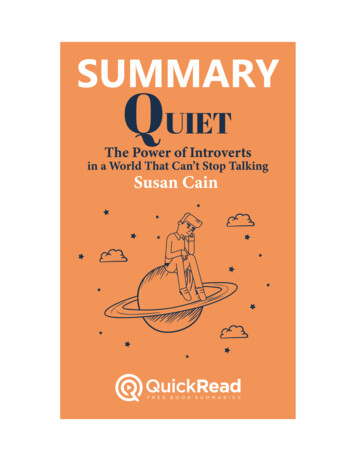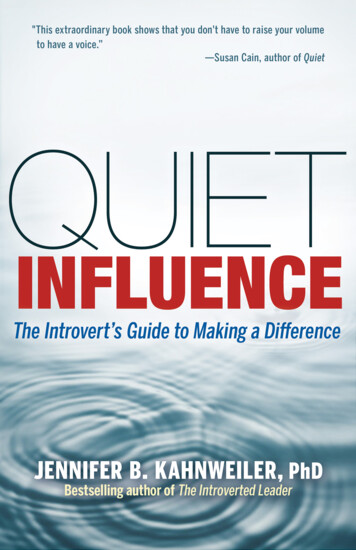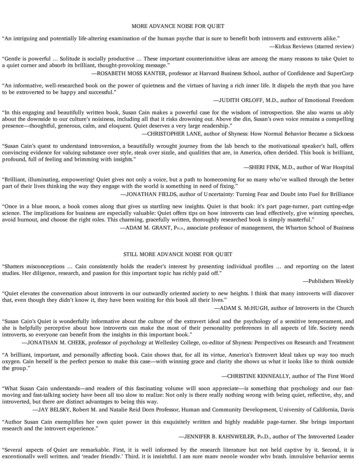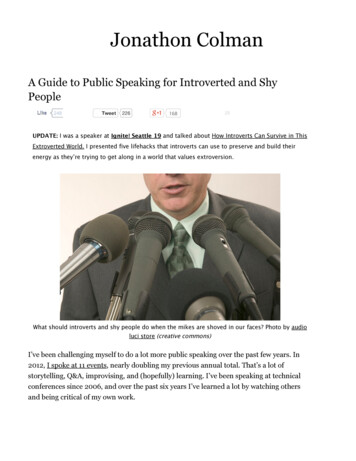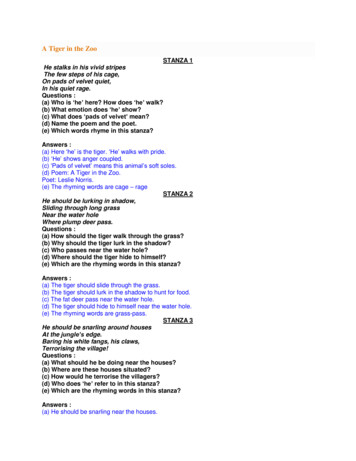
Transcription
QUIET:THE POWER OF INTROVERTS IN A WORLD THAT CAN'T STOP TALKINGThis document is restricted for personal use only
B O O K S U M M A RYT H E B O OKQuiet:The power of introverts in a world that can'tstop talkingBy Susan CainIN T RODUC TIONIn every class, in every team and in every office, there is a ‘quiet one’. Usuallyregarded as shy and unsociable, this person is reluctant to speak out in groupdiscussions and dreads giving presentations. After work or school, they arehome alone with a book instead of seeking the company of others. If they doattend a social function, you are more likely to see them in a deep discussionwith just one person instead of in the midst of a lively group. The book ‘Quiet,The power of introverts in a world that can't stop talking’, lifts the lid on thehidden superpowers of the people we now recognise as introverts. Whilesociety has shifted over the last 100 years to celebrate confident, outspokenextroverts, it is often inward-gazing types who we can look to for big ideasand innovative solutions to our collective problems.As you read Susan Cain’s book, you will identify the personality traits ofstudents, friends and colleagues, and feel like you understand them for the veryfirst time. You may even recognise and finally accept your own need to spendtime in quiet contemplation. ‘Quiet’ is filled with fascinating insights aboutwhat drives our behaviour and causes some of us to crave the spotlight whileothers prefer to blend in. The publication also contains valuable lessons aboutwhy the introverts in our society are worth celebrating (quietly, of course).5 B E ST QUOTES“Introverts, in contrast, may have strong social skills and enjoy parties andbusiness meetings, but after a while wish they were home in theirpyjamas. They prefer to devote their social energies to close friends,colleagues, and family. They listen more than they talk, think before theyspeak, and often feel as if they express themselves better in writing than inconversation. They tend to dislike conflict. Many have a horror of small talk,but enjoy deep discussions.”“There's zero correlation between being the best talker and having the bestideas.”“Don't think of introversion as something that needs to be cured.”“The secret to life is to put yourself in the right lighting. For some, it's aBroadway spotlight; for others, a lamplit desk. Use your natural powers -- ofpersistence, concentration, and insight -- to do work you love and workthat matters. Solve problems. Make art, think deeply.”“We don't need giant personalities to transform companies. We needleaders who build not their own egos but the institutions they run.”B O O K S U M M A RY: QU I E T 0 1
B O O K S U M M A RY1 . THE EX TR OVE R T I DE ALBack in the early 1900s, society, and American society in particular,11 L E SSON Sfor Leadersabout the Powerof Introvertscelebrated people who were honest, faithful and who put others abovethemselves. After the industrial revolution, a shift occurred. Societyprogressed to celebrate personality over strength of character. As salesbecame key and looks more important, the extrovert cemented his (andher) place as leader. The world became a far more competitive place andthose who put themselves forward with confidence outperformed others.Being placid or feeling insecure evolved into undesirable personality traits.As a result, introverts, who are believed to make up a third of the world’spopulation, found themselves growing up feeling like they were nevergood enough.2 . W HEN COLL ABOR ATION K I LLS CR E ATI VI T YA typical extrovert thrives in a group environment. They love social outingsand animated discussions. Workplaces, schools and teams have adaptedto this by encouraging open-plan workspaces and classrooms andfacilitating regular group discussion and debate.This is an introvert’sworst nightmare. These personality types are thoughtful, not forceful. Evenif they can come up with a good idea, they may lack the confidence to putit forward in a group situation.As a result, many amazing ideas gounheard and many bad ones go unchallenged. Consider that SteveWozniak, a self-confessed introvert, designed the Apple computer alone,after hours of uninterrupted tinkering. It is unlikely his creation would haveseen the light of day if he were forced to brainstorm it amongst colleagues.3. I S TEM PE R AME N T DE STI N Y?Susan Cain’s research into her own introversion revealed that introvertshave a lot of physical as well as behavioural markers. For example, theirbrains and bodies react far more strongly to stimulation than extroverts.Introverts tend to be ‘high reactive’, meaning they have a more intenseresponse to new situations, confronting images and even the taste of alemon. As a result, they become overwhelmed more easily. There isnothing wrong with being this way! But knowing someone is high-reactivecan explain a lot about their reluctance to try new things or step outsidetheir comfort zone. What’s more, knowing a child’s tendency towardsintroversion or extroversion can help you cater to their needs as a parent orteacher.B O O K S U M M A RY: QU I E T 0 2
B O O K S U M M A RY4 . B EYON D TE MPE R AME N T: TH E R OLE OF FR E E W I LLIntroversion and extroversion, like many things, exist on a sliding scale. You11 L E SSON Sfor Leadersabout the Powerof Introvertscan also be an ‘ambivert’ who loves to socialise but needs to follow up a bigouting with time alone. What’s more, you can be an introvert and still existhappily in an extrovert’s world. This includes attending social events,making presentations and feeling heard in the workplace. As Susan Cainexplains, Bill Gates will never be Bill Clinton, and vice versa. However, bothcan stretch their personalities to suit what’s needed in their environments.This is possible thanks to the power of self-reasoning, the parts of ourbrains that assure us we don’t actually need to run and hide when facedwith a room full of strangers. Through practice and self-reasons, manyintroverts learn over time to adapt to environments where they feeluncomfortable.5. W HY ‘CO OL’ I S OVE R R ATE DOne of history’s most impressive teams was politician Franklin Rooseveltand his wife Eleanor. Eleanor, an introvert, spent a great deal of timeworking with the poor and disadvantaged. Although shy, she was forcefulwhen it came to encouraging her husband to establish the right policiesfor these people.Eleanor was not ‘cool’ in the sense of being astereotypical leader or having unwavering emotions. However, sheleveraged her passion and sensitivity to fight for the greater good.Different situations call for different characteristics. In nature, someanimals thrive by hiding, others survive by attacking with force. The humanrace needs ‘shy’ animals who spend time in quiet contemplation just asmuch as it needs ‘bold’ ones who speak up and out.6. WHY WALL STREET CRASHED AND WARREN BUFFETT PROSPEREDDuring the dotcom boom in the early 2000s, finance expert Warren Buffettwas one of the first to predict a collapse. He understood the warning signsand thus was able to weather the storm, as he has done in many otherfinancial situations. In 2008, the world’s economy took a hit from theGlobal Financial Crisis. Many extroverts had the finger of blame pointed atthem after this crisis. It is believed the financial downturn happened partlybecause risk-taking extroverts had control of Wall Street. When a risk paidoff, it delivered a ‘dopamine hit’, which led to further questionabledecisions. Behind the scenes, many introverts could see what washappening but they found it difficult to make their voices heard. This is therisk of an extrovert-heavy team. You need thoughtful, analytical, risk-averseintroverts to keep score and ensure the right decisions are being made.B O O K S U M M A RY: QU I E T 0 3
B O O K S U M M A RY7. SOF T P OW E R11 L E SSON Sfor Leadersabout the Powerof IntrovertsWhile America celebrates the extrovert, other cultures highlight introverts ashigh achievers. For example, in the US, many Asian students find themselvesmisunderstood. Generally speaking, this is because Asian cultures favourstudy, hard work and academic results over sports, social outings and groupactivities. The sense of duty is to family, not to friends, and the emphasis is onstaying quiet, not speaking out. Cultural awareness is so important in thissituation. Neither is right or wrong, it is just that societies have evolved indifferent ways. What’s also worth noting is that neither style is prohibitive toleadership, especially if nurtured in the right ways.8. W HEN TO BE AN E X TR OVE R TAll over the world, introverts achieve amazing things. Many speak on stage,sometimes as a weekly part of their job. Some brilliant public speakers wouldsurprise you when they explain they are actually an introvert. These figures relyon their passion to come out of their shell. They are excited to share what theyknow and they have found a way to overcome their reluctance to step out inpublic. To counter the over-stimulation, many compensate with allocatedquiet time. According to ‘Free Trait Theory’, introverts are capable of acting likeextroverts for the sake of work they consider important.9. THE C OMMUN ICATION GAPMany introverts are married to or in relationships with extroverts. The blend ofpersonalities encourages one to push themselves beyond their comfort zoneand the other to slow down and think things through more carefully. What’sessential in this situation is compromise and understanding. Extroverts tend toargue more forcefully and with more passion because of their commitment totheir partner. Introverts see this as a threat and shut down, which theirpartners find offensive. Acknowledging each other’s needs and finding amiddle ground are key to an enduring introvert/extrovert relationship.B O O K S U M M A RY: QU I E T 0 4
B O O K S U M M A RY10. CULTIVATING QUIET KIDS IN A WORLD THAT CAN’T HEAR THEM11 L E SSON Sfor Leadersabout the Powerof IntrovertsIntroverted children can become lost and feel there is something wrong withtheir personalities when they are constantly encouraged to be social andoutgoing. Often, extroverted parents become confused when their introvertedchildren resist the push towards playdates and outdoor adventures. Once theyunderstand that their child is happy being alone with a book, parents can relaxand stop scheduling so many activities. The parent’s ideal role with anintroverted child is to understand and encourage. If their child is feeling shy orreluctant to try something new, they can push for very small steps. Start withsitting by the ocean instead of diving in, and progress to paddling beforefacing big waves. If you have an introverted child, talk things through and try tosee the world through their eyes. What’s most important is that they areenjoying themselves.11. WONDERLANDAs Susan Cain writes, “The secret to life is to put yourself in the right lighting.”“Figure out what you are meant to contribute to the world and make sure youcontribute it. If this requires public speaking or networking or other activitiesthat make you uncomfortable, do them anyway. But accept that they aredifficult, get the training you need to make them easier, and reward yourselfwhen you’re done.” “If you are a teacher, enjoy your gregarious andparticipatory students. But don’t forget to cultivate the shy, the gentle, theautonomous, the ones with the single-minded enthusiasm for chemistry setsor parrot taxonomy or nineteenth-century art. They are the artists, engineersand thinkers of tomorrow.”B O O K S U M M A RY: QU I E T 05
B O O K S U M M A RYThink about the introverts in your world. You may have concluded they arelazy, uncooperative or that they just don’t like you. In reality, they are not inthe best ‘lighting’ to engage with you and demonstrate their trueAC T ION STEPSpotential.If you’re a teacher or team leader, create a variety of ways for introverts tocontribute. They may prefer documenting their brainstorming ideasquietly on paper. Instead of a presentation, they may wish to make a video.When speaking to an audience is unavoidable for your students or staff,help them by starting them in a smaller group or at least let them knowyou understand why they find the task so challenging.Are you an introvert? Make peace with yourself. You don’t have to changebut it can help to explain to others why you choose to avoid certainsituations. Use your preferred methods of communication to come up witha plan that lets you contribute your own incredible expertise and insights.B O O K S U M M A RY: QU I E T 0 6
B O O K S U M M A RYWe live in a diverse world and everyone has something to contribute.By ignoring the ‘quiet ones’, we are missing out on well-calculatedsolutions and ideas.1 KE Y TA KEAWAYUnderstanding the challenges an introvert faces in an extrovert’s worldand realising why some people hate the spotlight will help youapproach introverts or being introverted in a whole new way.Both sides of the spectrum have something to offer and should beequally catered to and celebrated.B O O K S U M M A RY: QU I E T 07
want more?visit thehopefullinstitute.comemail hello@thehopefullinstitute.comcall 61 2 9943 0350
By Susan Cain BOOKSUMMARY BOOKSUMMARY: QUIET 01 THE BOOK INTRODUCTION 5 BEST QUOTES In every class, in every team and in every office, there is a ‘quiet one’. Usually regarded as shy and unsociable, this person is reluctant to speak out in group discussions and dr


